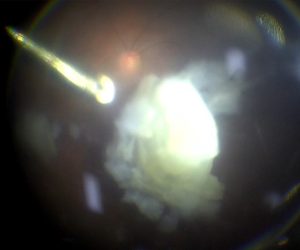OUR SPECIALTIES
Complications of cataract surgery
 Cataract surgery is a widely performed procedure in India today, often considered as one of the safest and most successful surgeries a patient can undergo in their lifetime. However, as with any surgical intervention, there is always a potential for complications. Some recognized risks associated with cataract surgery encompass infection, eye floaters, formation of scar tissue, inflammation, lens displacement, glare, halos, drooping eyelid, elevated eye pressure, retinal tear, or retinal detachment. Should specialized retina care be necessary following cataract surgery, your ophthalmologist may recommend a consultation with a retina specialist.
Cataract surgery is a widely performed procedure in India today, often considered as one of the safest and most successful surgeries a patient can undergo in their lifetime. However, as with any surgical intervention, there is always a potential for complications. Some recognized risks associated with cataract surgery encompass infection, eye floaters, formation of scar tissue, inflammation, lens displacement, glare, halos, drooping eyelid, elevated eye pressure, retinal tear, or retinal detachment. Should specialized retina care be necessary following cataract surgery, your ophthalmologist may recommend a consultation with a retina specialist.
One common complication that may arise after cataract surgery is known as cystoid macular edema (CME). This condition emerges due to varying degrees of inflammation in the eye following the procedure. Typically, this inflammation is managed through the use of steroid eye drops for several weeks, following a standard drop regimen advised by your surgeon. In some instances, pockets of fluid can develop within the macula of the retina, leading to swelling or edema. This edema often results in a noticeable decline in vision in the operated eye. While vision may initially be quite clear after surgery, it may gradually deteriorate as the edema progresses. Depending on the extent of the swelling, your ophthalmologist may adjust your post-operative drop routine. Your surgeon might also refer you to a Retina Specialist or Retinologist for further evaluation and treatment. This type of swelling is more prevalent in individuals who are diabetic or have previously experienced retinal damage from conditions such as retinal detachment or vein occlusion.

